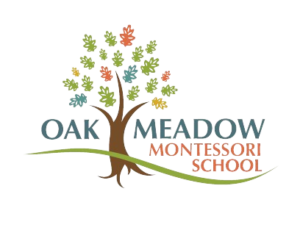Challenging racism is integral to our Montessori school purpose
Many independent schools nationwide are thinking more deeply than ever before about the importance of anti-racism in school communities. I’ve been part of conversations about anti-racism almost weekly with school heads around the country, including independent and Montessori school associations locally and nationally.

Artwork by OMS art teacher Catherine Karp
Given the founding purpose of many private schools, this is a conversation that is causing a real reckoning with the past. I was startled and encouraged to read the following statement about this school identity crisis in the most recent issue of Independent School Magazine, “We fail to be equitable, diverse, or inclusive because our brand is hierarchy, privilege, and exclusion.”*
At Oak Meadow School, we’ve certainly been doing a lot of soul searching ourselves, honestly coming to grips with the fact that we have not lived up to our responsibility to adequately address the needs of the students and families of color in our own school community. At the opening of the weekly faculty/staff meeting this afternoon, one teacher shared the following:
“We are at a time of reckoning with racism and the urgency of anti-racism. We have not been educated to talk about racism. It is difficult, challenging and painful. But people of color face racism often, if not daily, and they do not have the option to talk about it when it’s comfortable or convenient for them. There is no ‘ideal’ time to talk about racism and it isn’t meant to be a comfortable or easy dialogue. But this work is neither trendy nor tangential to our jobs as educators. Rather it is integral and necessary if we are to see any changes and to be the change we want to see. We believe that these are important steps that we as a community are taking. We acknowledge that we might make mistakes, and that this work will be difficult, uncomfortable, and messy.”
With the holiday this Monday celebrating the life of Dr. Martin Luther King, these words from him seem particularly relevant: “The time is always right to do what is right.”
Why challenging racism is integral to the purpose and value-system of Oak Meadow School:
- Oak Meadow was never founded as an exclusive school where families enrolled on the basis of privilege. The founder of Oak Meadow, Michelle DuBois, told me, “It was a founding goal of the school to be accessible to families in the surrounding communities at a reasonable cost.” Our school is strongly aligned with the values of millennial parents today who seek to raise children who are happy, healthy, and socially well-balanced; and who are equipped in school to have the skills and experiences necessary to be successful in an increasingly complex world.
- Self-awareness is at the heart of Montessori education. This includes deep introspection and self-development of identity, values, the formation of character, and a commitment to good decision-making and action. This is facilitated by our SEL curriculum, which includes challenging bias in ourselves and learning to more deeply appreciate the perspectives and experiences of others.
- Developing effective skills in teamwork and collaboration are central to our philosophy of learning. This is reinforced by multi-age classrooms and the development of collaboration skills which include an ability to learn how to appreciate the best in others and find ways to leverage the ideas and talents of others in solving complex problems.
- Developing children as change agents for peace and justice was a unique life ambition of Dr. Maria Montessori and was very much at the core of her reason for launching the Montessori movement. This is evidenced in our focus on conflict resolution, actively engaging in problem-solving work in the community, and mandatory middle school participation in the Montessori Model UN program. The work of peace and justice is not superficial. It demands uncovering and dismantling the systems that perpetuate racism, injustice, and bias, as well as developing a global perspective.
- The nature program is fully integrated into every program level at our school, providing students with a deep respect for nature and an understanding of how important it is to live life in balance within the laws of nature and our world’s natural ecosystem. This includes a commitment to challenging practices in our school, community, and world that are inequitable, unsustainable, wasteful, or harmful to our common humanity and care for the planet we share together.
Steps have we taken this year at Oak Meadow School to address anti-racism
- Our school accreditation agencies (AISNE and AMS) have provided directives to include anti-racism in our schools policies, practices, and vision statements
- The school’s Diversity, Equity, and Inclusivity (DEI) task force (made up of board members, teachers and parents) reviewed and assessed the community-wide climate survey conducted at the end of last school year. The message we heard from members of our community is that we need to do better when it comes to diversity, equity, and inclusivity at our school
- The Board of Trustees agreed to make anti-racism a primary area of focus for this school year
- The administration agreed to use an anti-racist lens to develop new goals and action plans for hiring, enrollment, curriculum, and SEL
- The DEI task force developed the following goals for the year: (a) create an anti-racism statement that is clear, active, and urgent. This is now in draft form and will be shared with the whole school community this spring. (b) write an anti-bias hiring policy. A committee is currently working on a first draft. (c) develop a general DEI statement that embraces diversity in many different social constructs, including gender, physical ability, learning style, religion, economic status, and others. (d) take one faculty meeting a month and use part of the time to work on diversity through workshops and small group discussions.
I look forward to sharing more details with all parents as the school continues to work through these next steps.
* “This Time is Different… and Other Fairy Tales,” by Gustavo Carrera, Independent School Magazine, winter 2021.





